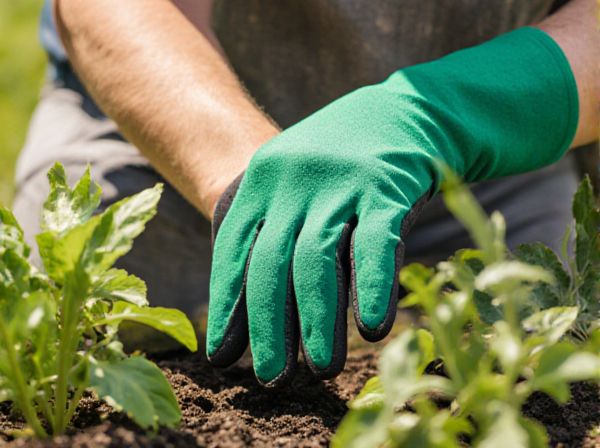
Integrated Pest Management vs Broad-Spectrum Pesticides Illustration
Integrated Pest Management (IPM) emphasizes targeted pest control through biological methods, cultural practices, and minimal chemical use, promoting environmental sustainability and reducing health risks. Broad-spectrum pesticides, while effective against a wide range of pests, often disrupt ecosystems, harm beneficial insects, and contribute to pesticide resistance. Choosing IPM supports organic farming by maintaining ecological balance and enhancing long-term crop resilience.
Table of Comparison
| Criteria | Integrated Pest Management (IPM) | Broad-Spectrum Pesticides |
|---|---|---|
| Definition | Eco-friendly pest control using monitoring, biological, and cultural methods. | Chemicals targeting a wide range of pests indiscriminately. |
| Environmental Impact | Minimal; preserves beneficial insects and biodiversity. | High; harms non-target species and disrupts ecosystems. |
| Human Health | Lower risk due to reduced chemical use. | Higher risk from toxic exposure and residues. |
| Effectiveness | Targeted and sustainable; reduces pest resistance. | Immediate and broad pest elimination but risk of resistance buildup. |
| Cost | Variable; may require initial investment but reduces long-term expenses. | Often lower upfront cost but can increase with repeated applications. |
| Use in Organic Farming | Approved and widely recommended. | Prohibited due to chemical nature. |
Understanding Integrated Pest Management in Organic Gardening
Integrated Pest Management (IPM) in organic gardening emphasizes a combination of biological, cultural, mechanical, and chemical controls to manage pest populations sustainably. Unlike broad-spectrum pesticides, which indiscriminately target pests and beneficial organisms, IPM focuses on monitoring pest levels and promoting natural predators to maintain ecological balance. This approach reduces chemical usage, enhances soil health, and supports long-term plant resilience in organic systems.
What Are Broad-Spectrum Pesticides?
Broad-spectrum pesticides are chemical agents designed to target and eliminate a wide range of pests, including insects, fungi, and weeds, across diverse crops. Their extensive efficacy contrasts with integrated pest management (IPM) strategies, which emphasize selective, environmentally sustainable measures. While broad-spectrum pesticides offer rapid pest control, they often disrupt beneficial insect populations and can lead to increased resistance, impacting long-term ecological balance.
Key Principles of Integrated Pest Management
Integrated Pest Management (IPM) emphasizes ecosystem balance by using biological, cultural, and mechanical control methods to minimize pest damage while reducing chemical pesticide use. IPM relies on regular monitoring, accurate pest identification, and threshold-based interventions to target pests only when necessary. This approach promotes sustainability and enhances crop health by integrating natural predator conservation and selective pesticide application.
Environmental Impact: IPM vs Broad-Spectrum Pesticides
Integrated Pest Management (IPM) emphasizes targeted pest control methods that minimize harm to non-target species and preserve biodiversity, reducing chemical residues in soil and water. Broad-spectrum pesticides often lead to widespread environmental contamination, harming beneficial insects, pollinators, and aquatic ecosystems. The selective approach of IPM supports sustainable agriculture by promoting ecological balance and reducing pesticide resistance buildup.
Health and Safety Concerns in Organic Gardening
Integrated Pest Management (IPM) in organic gardening prioritizes natural predators, crop rotation, and biological controls to minimize pest damage while reducing health risks associated with chemical exposure. Broad-spectrum pesticides, in contrast, often contain synthetic chemicals that can harm beneficial insects, contaminate soil, and pose toxic risks to gardeners and consumers. Emphasizing IPM promotes safer, eco-friendly pest control methods aligned with organic standards and long-term health sustainability.
Efficacy of IPM Against Common Garden Pests
Integrated Pest Management (IPM) demonstrates high efficacy against common garden pests by combining biological controls, cultural practices, and targeted chemical treatments, reducing pest populations sustainably. Unlike broad-spectrum pesticides, which indiscriminately eliminate beneficial insects and can lead to pest resistance, IPM promotes ecological balance and long-term pest suppression. Studies show gardens implementing IPM experience fewer pest outbreaks and higher crop yields compared to those relying solely on broad-spectrum chemical sprays.
Residue and Soil Health: Comparing Pest Control Methods
Integrated Pest Management (IPM) minimizes pesticide residues by using targeted, environmentally friendly control techniques that preserve soil microbial diversity and enhance long-term soil fertility. Broad-spectrum pesticides often leave harmful chemical residues that accumulate in soil, disrupting beneficial organisms and degrading soil health over time. Choosing IPM supports sustainable agriculture by reducing chemical buildup and maintaining a balanced soil ecosystem essential for crop productivity.
Biodiversity: Protecting Beneficial Insects
Integrated Pest Management (IPM) prioritizes biodiversity by targeting specific pests, reducing harm to beneficial insects such as pollinators and natural predators. Broad-spectrum pesticides often eliminate a wide range of insects, disrupting ecological balance and diminishing beneficial insect populations critical for crop health. Preserving beneficial insects through IPM promotes sustainable agriculture and enhances ecosystem resilience against pest outbreaks.
Cost and Labor: IPM vs Chemical Solutions
Integrated Pest Management (IPM) reduces costs by targeting specific pests, minimizing the need for frequent chemical applications, which lowers labor intensity and resource expenditure. Broad-spectrum pesticides often require repeated treatments due to pest resistance and non-specific targeting, increasing both material costs and labor demands. IPM enhances long-term economic efficiency by integrating biological controls and monitoring, while chemical solutions can lead to higher short-term expenses and labor risks.
Sustainable Strategies for Long-term Pest Control
Integrated Pest Management (IPM) employs a combination of biological, cultural, and mechanical methods to control pests sustainably, minimizing reliance on chemical interventions. Broad-spectrum pesticides target a wide range of pests but often disrupt beneficial insect populations and contribute to pest resistance, leading to ecological imbalance. IPM's targeted approach promotes long-term pest control by preserving natural predator populations and reducing environmental impact, aligning with sustainable agricultural practices.
Integrated Pest Management vs Broad-Spectrum Pesticides Infographic

 gardendif.com
gardendif.com